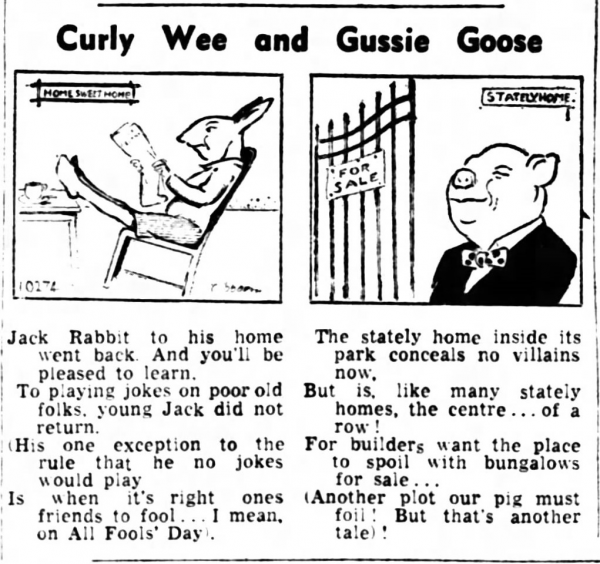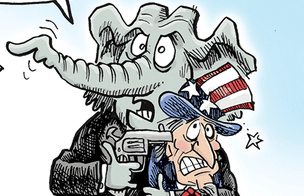Curley Wee and Wayback Whensday
Skip to commentsAmong its attractions and achievements Liverpool England is, according to Wikipedia, “an important cultural centre within the United Kingdom, incorporating music, performing arts, museums and art galleries, literature and nightlife amongst others.” Most notably it is where they first appeared.
“They” being Curly Wee and Gussie Goose.


above: the first and second installments of Curly Wee and Gussie Goose from 1937.
Created by Maud Budden (verses) and Roland Clibborn (art) the two-panel strip, with script below the drawing, first appeared on September 20, 1937 in The Liverpool Echo.
As we often do with regard to comic strips from Great Britain, TDC turns to John Freeman and downthetubes:
Research reveals the strip was published between 20th September 1937 until at least 31st December 1969, the strip, originally distributed by Newspaper Features Ltd., now syndicated through The Press Association, running in papers that include the Irish Independent.
“Curly Wee” was originally written by the poet, writer and journalist Maud Budden (real name Dora Magdalene, nee Fraser), who wrote the stories in both these books offered, and drawn by Clibborn.

In total, “Curly Wee” fan Nicholas Morrison, who has assembled quite an archive of the strip, noted back in 2006, the numbers strip ran from 1 to [
11991099], 2000 – 10,274 and from 1 to [1004720] drawn by “Clark”, his last story first appearing in the Birmingham Mail.
The comic, also known as just Curley Wee and Count Curley Wee, was very popular and ran in papers throughout the world – from Ireland to India, from Australia to South Africa.
Original artist Roland Clibborn drew the daily-only strip (with some assistance toward the end) for The Echo until September 9, 1967 (#10274) when the mysterious Clark took on the feature on September 11, 1967 (starting over with #1).


above: Clibborn’s last and Clark’s first
The comic would continue with the new Clark strips until December 31, 1969, a Wednesday. The following day The Liverpool Echo began running old Budden/Clibborn strips.


above: the last (#720) new Curley Wee strip and the January 1, 1970 Curley Wee restart from the beginning
UPDATE
Nicholas Morrison added additional information about the last Clark Curley Wee:
When in Birmingham to carry out some copying I discovered that they had published one further story in 1969/1970 extending Clark’s run from 720 to 816.Birmingham had taken up the series at 4015,but although behind the Liverpool by about 450, when Clark started to draw the cartoon they did not complete the Clibborn series.


above the first and last installments of The Birmingham Mail exclusive(?) last story.
The Birmingham Mail was running Curley Wee a few days earlier than The Liverpool Echo, so the continued Clark Curley Wee ran from December 27, 1969 (#721) to April 18, 1970 (#816). After #816 The Mail dropped Curley Wee completely, not continuing with reruns.
Now back to our earlier posted item.
Those reprinted strips have been running through all the following decades, though the newspapers and syndicates have changed, until…

Eighty-six years after it began, and after fifty-three years of reprints, Curley Wee ends its newspaper run.
Kim Bielenberg at The Irish Independent broke the news:
The year was 1937. Hitler was stalking Europe, there was already an air of menace abroad and the Irish Independent reported that the price of bread was going up by a ha’penny.
The news was grim, but into this dark and sinister world stepped an upstanding aristocratic pig called Curly Wee in a top hat – alongside his trusty sidekick Gussie Goose…
Curly Wee and Gussie Goose, alongside their friend Ginger Dick, were familiar characters, evocative of Irish childhoods from the late 1930s onwards.
But after 86 years, it all came to an end this week as the editor announced with regret that Count Curly was finally hanging up his top hat and gaiters. The publication of the cartoon was discontinued.
No end date of the reruns was given. Was it September 12, the date of the tweet above? September 11?


Comments 4
Comments are closed.